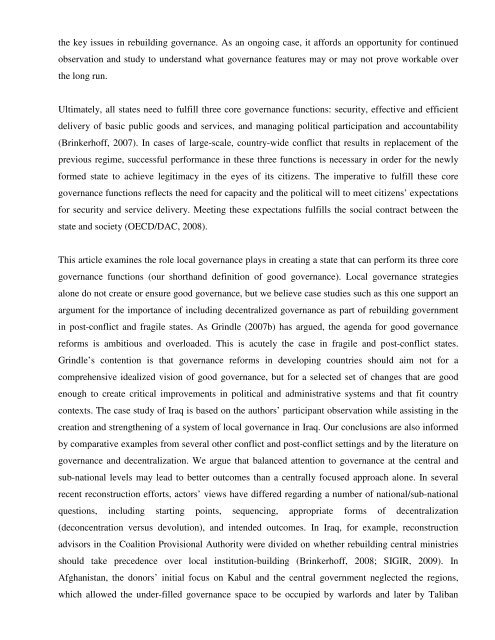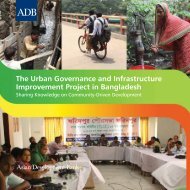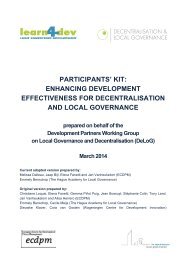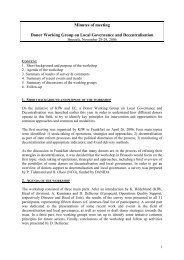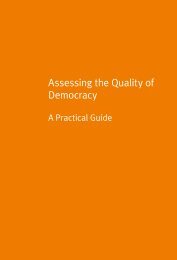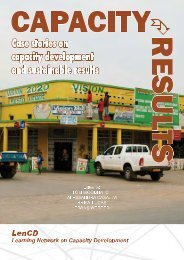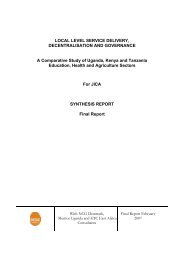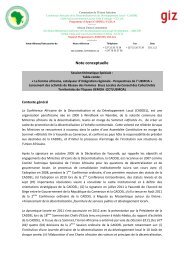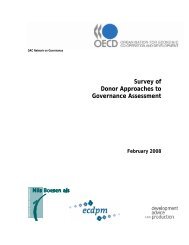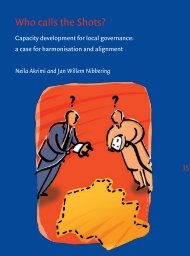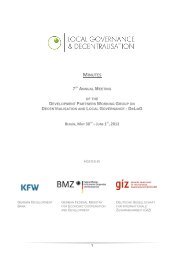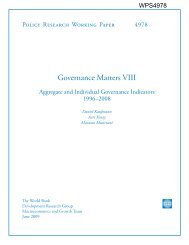Decentralized Local Governance In Fragile States ... - DeLoG
Decentralized Local Governance In Fragile States ... - DeLoG
Decentralized Local Governance In Fragile States ... - DeLoG
You also want an ePaper? Increase the reach of your titles
YUMPU automatically turns print PDFs into web optimized ePapers that Google loves.
the key issues in rebuilding governance. As an ongoing case, it affords an opportunity for continuedobservation and study to understand what governance features may or may not prove workable overthe long run.Ultimately, all states need to fulfill three core governance functions: security, effective and efficientdelivery of basic public goods and services, and managing political participation and accountability(Brinkerhoff, 2007). <strong>In</strong> cases of large-scale, country-wide conflict that results in replacement of theprevious regime, successful performance in these three functions is necessary in order for the newlyformed state to achieve legitimacy in the eyes of its citizens. The imperative to fulfill these coregovernance functions reflects the need for capacity and the political will to meet citizens’ expectationsfor security and service delivery. Meeting these expectations fulfills the social contract between thestate and society (OECD/DAC, 2008).This article examines the role local governance plays in creating a state that can perform its three coregovernance functions (our shorthand definition of good governance). <strong>Local</strong> governance strategiesalone do not create or ensure good governance, but we believe case studies such as this one support anargument for the importance of including decentralized governance as part of rebuilding governmentin post-conflict and fragile states. As Grindle (2007b) has argued, the agenda for good governancereforms is ambitious and overloaded. This is acutely the case in fragile and post-conflict states.Grindle’s contention is that governance reforms in developing countries should aim not for acomprehensive idealized vision of good governance, but for a selected set of changes that are goodenough to create critical improvements in political and administrative systems and that fit countrycontexts. The case study of Iraq is based on the authors’ participant observation while assisting in thecreation and strengthening of a system of local governance in Iraq. Our conclusions are also informedby comparative examples from several other conflict and post-conflict settings and by the literature ongovernance and decentralization. We argue that balanced attention to governance at the central andsub-national levels may lead to better outcomes than a centrally focused approach alone. <strong>In</strong> severalrecent reconstruction efforts, actors’ views have differed regarding a number of national/sub-nationalquestions, including starting points, sequencing, appropriate forms of decentralization(deconcentration versus devolution), and intended outcomes. <strong>In</strong> Iraq, for example, reconstructionadvisors in the Coalition Provisional Authority were divided on whether rebuilding central ministriesshould take precedence over local institution-building (Brinkerhoff, 2008; SIGIR, 2009). <strong>In</strong>Afghanistan, the donors’ initial focus on Kabul and the central government neglected the regions,which allowed the under-filled governance space to be occupied by warlords and later by Taliban


